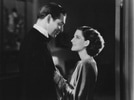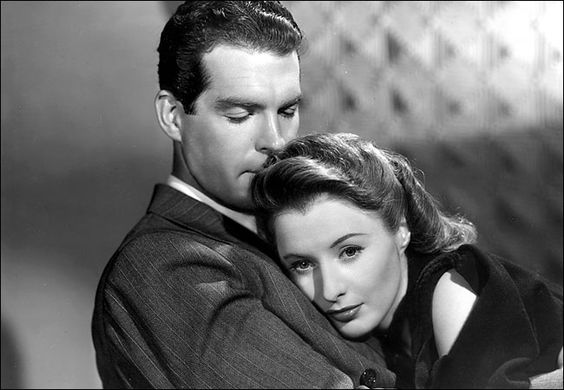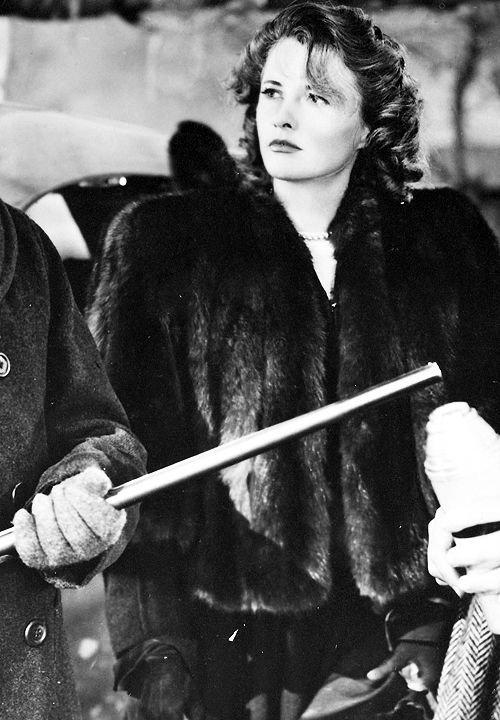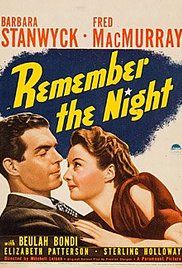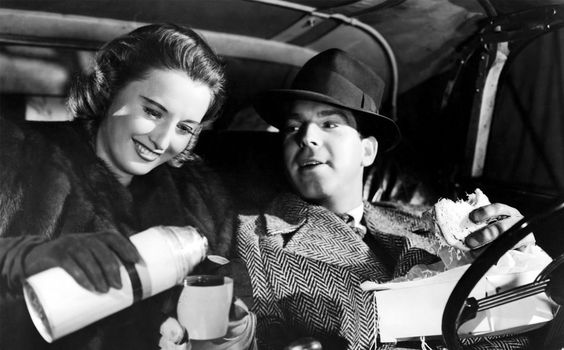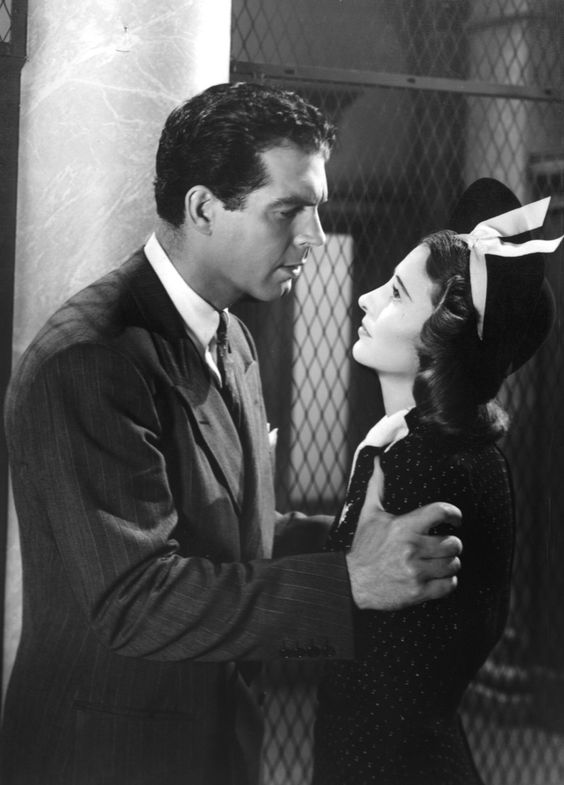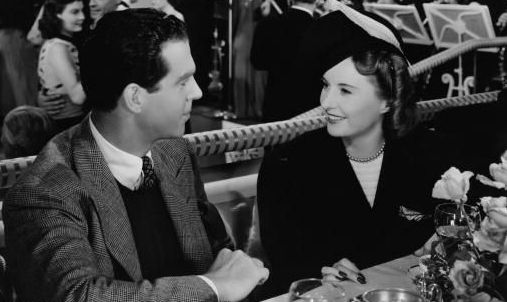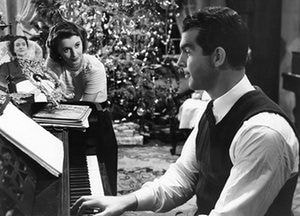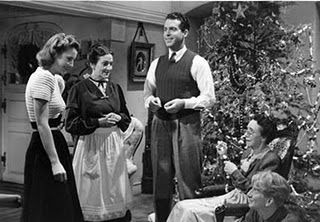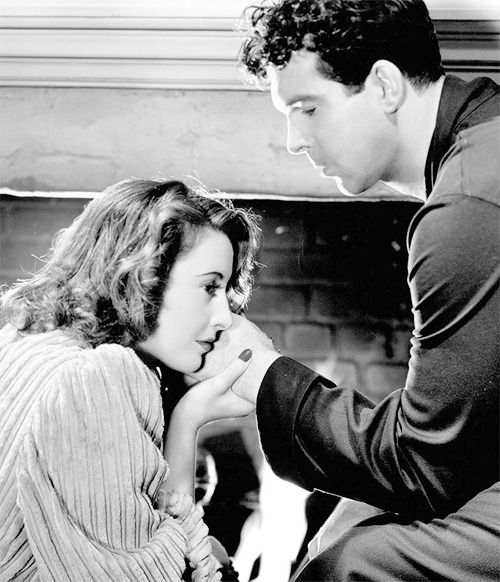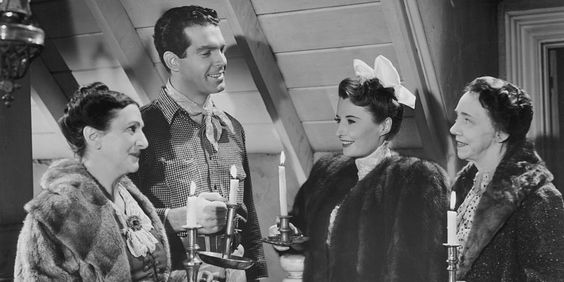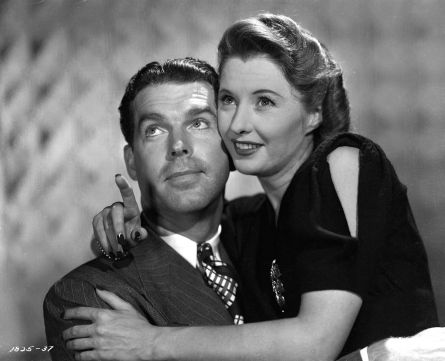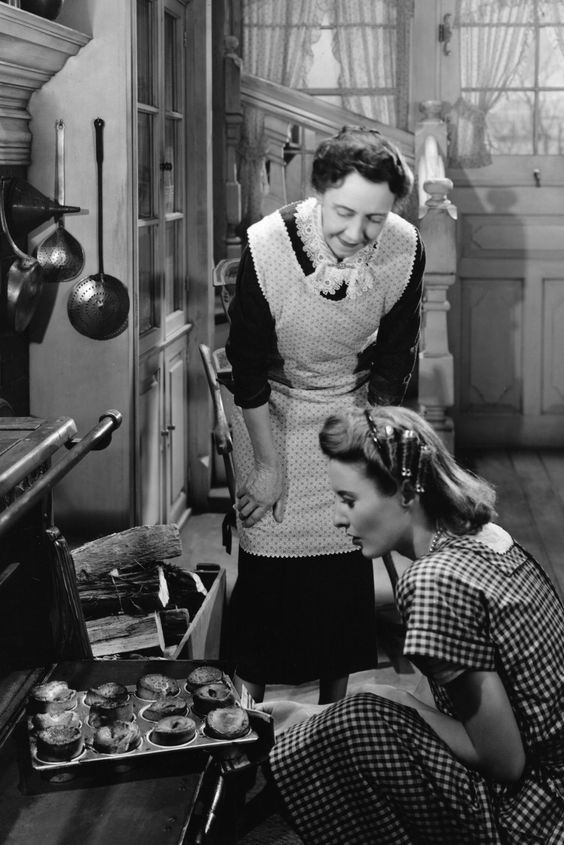Plot:
John Sargent (MacMurray) is the go to man in the New York District Attorney’s office to prosecute female defendants. He has a perfect record & is self-assured and all-knowing in the courtroom. When he is faced with convicting petty jewelry thief Lee Leander (Stanwyck) a few days before Christmas, he uses all his wiles to get a continuance until after holidays to avoid a sympathetic jury. Once the continuance is achieved, however, remorse sets in for having put Lee in jail during the holidays, so he bails her out, only to have the bail bondsman dump her at his place. Offering to buy her a holiday dinner & put her up in a hotel, they discover that they grew up a mere 50 miles from each other in Indiana, so Sargent offers to drop her at home for the holidays. The road trip reveals that Lee is smarter & more sensitive than the average crook & that Sargent is a sensitive soul, reliant on the belief that honesty is a simple construct. When the pair stop off at Lee’s mother’s house they find her mean & cruel towards Lee, branding her garbage & sending them on their way. Sargent offers to bring her to his mother’s house, which is filled with love and a welcoming spirit for Lee. Sargent’s mother (Bondi), Spinster aunt (Patterson) & farm hand Willie (Holloway) welcome Lee as one of the family, enlightening Lee of the finer points of a loving family. The week progresses to a New Year’s Eve barn dance where John & Lee acknowledge their feelings for one another. When Sargent’s mother explains his struggles form poverty to the DA’s office, Lee agrees to back off for fear of ruining his career. Once back in court in New York Sargent goes after Lee harshly on the witness stand, in an attempt to turn the jury against him & win an acquittal, but Lee confesses and is found guilty. The finale has the couple deciding whether they can ever be together.
John Sargent (MacMurray) is the go to man in the New York District Attorney’s office to prosecute female defendants. He has a perfect record & is self-assured and all-knowing in the courtroom. When he is faced with convicting petty jewelry thief Lee Leander (Stanwyck) a few days before Christmas, he uses all his wiles to get a continuance until after holidays to avoid a sympathetic jury. Once the continuance is achieved, however, remorse sets in for having put Lee in jail during the holidays, so he bails her out, only to have the bail bondsman dump her at his place. Offering to buy her a holiday dinner & put her up in a hotel, they discover that they grew up a mere 50 miles from each other in Indiana, so Sargent offers to drop her at home for the holidays. The road trip reveals that Lee is smarter & more sensitive than the average crook & that Sargent is a sensitive soul, reliant on the belief that honesty is a simple construct. When the pair stop off at Lee’s mother’s house they find her mean & cruel towards Lee, branding her garbage & sending them on their way. Sargent offers to bring her to his mother’s house, which is filled with love and a welcoming spirit for Lee. Sargent’s mother (Bondi), Spinster aunt (Patterson) & farm hand Willie (Holloway) welcome Lee as one of the family, enlightening Lee of the finer points of a loving family. The week progresses to a New Year’s Eve barn dance where John & Lee acknowledge their feelings for one another. When Sargent’s mother explains his struggles form poverty to the DA’s office, Lee agrees to back off for fear of ruining his career. Once back in court in New York Sargent goes after Lee harshly on the witness stand, in an attempt to turn the jury against him & win an acquittal, but Lee confesses and is found guilty. The finale has the couple deciding whether they can ever be together.
Thoughts: Fred MacMurray & Barbare Stanwyck, more famously paired in Billy Wilder’s 1944 Noir classic Double Indemnity, are a perfect match on screen. MacMurray is tall, sturdy & handsome enough, without being unbelievable as the everyman he so often plays. Stanwyck is petite, strongwilled & just beautiful enough to be stunning without being off-putting. Their dynamic works because she is tough enough for the both of them & he has a calmness and a sense of grounded-ness that keeps their scenes together rooted in reality.
In the Preston Sturges penned & the Mitchell Leisen directed Remember the Night they are cast as opposites; he a straight shooter & she a crooked con-woman, who come to find love on a Christmas road trip. Initially, he doesn’t; he can’t, understand her. She appears nice & is pleasant to be with, but she is inherently corrupt and gives him an example on how her mind works differently than hers:
“If you were starving, would you steal a loaf of bread from a man outside his store?” , she asks. “You bet I would, ” he replies confidently. “That’s because you’re honest. I would chisel a 6 course meal across the street & pretend I left my purse at home. You get the difference?”
MacMurray wonderfully doesn’t allow a drop of cynicism creep into Sargent’s mind once he leaves court. When first ‘fat’ Mike, the bail bondsman, then Lee, assumes she has been bailed out & delivered to Sargent’s apartment purely for sexual repayment of his largess, he maintains a quizzical lack of understanding. His innocent question, “why are you here?” gets a perfect response from Lee, when she says sarcastically, “I don’t know, but I’ve got a pretty good idea.” They exist on two different plains of existence, yet MacMurray & Stanwyck create a spark of mutual attraction that is palpable. Lee has every reason to string him along to get acquitted, but the way Stanwyck plays it there is only a flicker of doubt as to her motives; she does seem to be generally smitten with Sargent before he even realizes what’s hit him.
When the two hit the road it becomes an initial comedy of errors as they get lost, crash, spend the night in a cow pasture & are arrested for a variety of crimes. When they appear before the justice of the peace, the movie takes a detour of sorts into the visible world of Preston Sturges, where chaos reigns & characters abound. There is the farmer/citizen sheriff & the frazzled justice of the peace who are comically painted as rubes who know just enough to extract a fine out of the city slickers, until Lee outwits them all by throwing a match into a waste paper basket & starting a fire. That Sargent is willing to play along with Lee’s ruse of giving false names & occupations becomes the first evidence that his morality is weakening & he may be succumbing to her charms. The plot element of being ‘on the run from the law’ is carried through in act 3 as they detour through Canada, allowing for a romantic stop at Niagara Falls.
In the Preston Sturges penned & the Mitchell Leisen directed Remember the Night they are cast as opposites; he a straight shooter & she a crooked con-woman, who come to find love on a Christmas road trip. Initially, he doesn’t; he can’t, understand her. She appears nice & is pleasant to be with, but she is inherently corrupt and gives him an example on how her mind works differently than hers:
“If you were starving, would you steal a loaf of bread from a man outside his store?” , she asks. “You bet I would, ” he replies confidently. “That’s because you’re honest. I would chisel a 6 course meal across the street & pretend I left my purse at home. You get the difference?”
MacMurray wonderfully doesn’t allow a drop of cynicism creep into Sargent’s mind once he leaves court. When first ‘fat’ Mike, the bail bondsman, then Lee, assumes she has been bailed out & delivered to Sargent’s apartment purely for sexual repayment of his largess, he maintains a quizzical lack of understanding. His innocent question, “why are you here?” gets a perfect response from Lee, when she says sarcastically, “I don’t know, but I’ve got a pretty good idea.” They exist on two different plains of existence, yet MacMurray & Stanwyck create a spark of mutual attraction that is palpable. Lee has every reason to string him along to get acquitted, but the way Stanwyck plays it there is only a flicker of doubt as to her motives; she does seem to be generally smitten with Sargent before he even realizes what’s hit him.
When the two hit the road it becomes an initial comedy of errors as they get lost, crash, spend the night in a cow pasture & are arrested for a variety of crimes. When they appear before the justice of the peace, the movie takes a detour of sorts into the visible world of Preston Sturges, where chaos reigns & characters abound. There is the farmer/citizen sheriff & the frazzled justice of the peace who are comically painted as rubes who know just enough to extract a fine out of the city slickers, until Lee outwits them all by throwing a match into a waste paper basket & starting a fire. That Sargent is willing to play along with Lee’s ruse of giving false names & occupations becomes the first evidence that his morality is weakening & he may be succumbing to her charms. The plot element of being ‘on the run from the law’ is carried through in act 3 as they detour through Canada, allowing for a romantic stop at Niagara Falls.
Once they arrive at Lee’s mother’ house the film takes another slight detour, but one with far more emotional impact. Up to this point in the film the mood has been light & the interactions between characters has been jovial and loose, even in the courtroom. When a cold & suspicious man opens the door and barks at Lee & Sargent it is apparent this will not a cordial visit. Her mother, however, is far worse and belittles Lee throughout the brief conversation, painting her as a thief, nothing more than garbage. The scene is in neither the language nor the tone of the rest of the movie, but it serves a valuable & poignant refection point for the rest of the movie. Lee’s hard edged character becomes fully realized, but most importantly she becomes sympathetic. The flaw in her character is a direct reflection of her miserable upbringing, her mother’s hatred towards her & her escape from her home in misery & shame. The fact that Struges/Leisen juxtaposes Lee’s mother’s reaction to her borrowing some money to Sargent’s mother’s later reaction to the same juvenile crime only reinforces Lee’s flaw as being imposed on her. Finally, and most obviously, the scene serves as a counter point to the warmth of the Sargent home that is so nurturing and accepting.
When the couple finally arrives at the family farm it is Willie who immediately states the obvious for Sargent to hear when he proclaims Lee “a real peacherino.” Sargent to this point has not acknowledged his feelings for Lee & continues to deny them, but Willie’s outburst makes it clear that anyone else would immediately be aware of Lee’s charms. Similarly, both the spinster aunt & Sargent’s mother realize that there is a connection between the couple, even if only Lee recognizes her feelings. As the holidays play out and Lee is allowed to understand a loving home and the feeling of family she continues to soften. Only when they are dancing close at the New Year’s Eve barn dance, it seems, does Sargent realize his feelings, or maybe only then is he willing to express them (as MacMurray plays it seems a revelation). Typically, this would complete they romantic comedy circle, with the couple overcoming their differences to find love, but this is a more complicated affair than all that.
Fortunately, the embrace & the kiss is only the end of act 2, for when Mrs. Sargent informs Lee how her presence would destroy Sargent’s career, the core elements of Sturges’ plot bubbles to the surface. Because he set out to write a modern retelling of Camille, he has to lift Lee up, redeem her by explaining her circumstances, then make her smart enough to realize that to fully love she must give it up. Sargent is too simple, too pure to realize love’s full impact, even going to far as to tell her to jump bail and stay in Canada. She plays along, humoring him & loving him to ensure the proper outcome and his salvation. As her trial scene concludes with her on the stand it is Lee who must be smarter than the courtroom savant, on his turf, in order to save him. Only her conviction can set him free & once she tearfully admits her guilt she gains her salvation. MacMurray is the perfect actor to play innocence & honesty against Stanwyck’s emotional strength. He is bewildered by her actions, but helpless to stop them.
Remember the Night has one of the most emotionally ambiguous endings, but it is in line with the intelligence of the entire picture. Redemption takes many forms & in Struges’ most complete portrait of a relationship he allows for a complicated twist on the happy ending. Yes, they will be together, but it is not immediate & it is not assured because there is a little thing called prison to contend with. In the end, as is typical of romantic comedies there is an embrace, but there are also the tears Sturges set out to produce and MacMurray & Stanwyck play the finale as they are meant to do so, holding onto the essence of their acting abilities; he grounded and solid & she full of strength and determination.
When the couple finally arrives at the family farm it is Willie who immediately states the obvious for Sargent to hear when he proclaims Lee “a real peacherino.” Sargent to this point has not acknowledged his feelings for Lee & continues to deny them, but Willie’s outburst makes it clear that anyone else would immediately be aware of Lee’s charms. Similarly, both the spinster aunt & Sargent’s mother realize that there is a connection between the couple, even if only Lee recognizes her feelings. As the holidays play out and Lee is allowed to understand a loving home and the feeling of family she continues to soften. Only when they are dancing close at the New Year’s Eve barn dance, it seems, does Sargent realize his feelings, or maybe only then is he willing to express them (as MacMurray plays it seems a revelation). Typically, this would complete they romantic comedy circle, with the couple overcoming their differences to find love, but this is a more complicated affair than all that.
Fortunately, the embrace & the kiss is only the end of act 2, for when Mrs. Sargent informs Lee how her presence would destroy Sargent’s career, the core elements of Sturges’ plot bubbles to the surface. Because he set out to write a modern retelling of Camille, he has to lift Lee up, redeem her by explaining her circumstances, then make her smart enough to realize that to fully love she must give it up. Sargent is too simple, too pure to realize love’s full impact, even going to far as to tell her to jump bail and stay in Canada. She plays along, humoring him & loving him to ensure the proper outcome and his salvation. As her trial scene concludes with her on the stand it is Lee who must be smarter than the courtroom savant, on his turf, in order to save him. Only her conviction can set him free & once she tearfully admits her guilt she gains her salvation. MacMurray is the perfect actor to play innocence & honesty against Stanwyck’s emotional strength. He is bewildered by her actions, but helpless to stop them.
Remember the Night has one of the most emotionally ambiguous endings, but it is in line with the intelligence of the entire picture. Redemption takes many forms & in Struges’ most complete portrait of a relationship he allows for a complicated twist on the happy ending. Yes, they will be together, but it is not immediate & it is not assured because there is a little thing called prison to contend with. In the end, as is typical of romantic comedies there is an embrace, but there are also the tears Sturges set out to produce and MacMurray & Stanwyck play the finale as they are meant to do so, holding onto the essence of their acting abilities; he grounded and solid & she full of strength and determination.
Category: Romantic Comedy
Random Notes & Quotes:
*Remember the Night was originally titles “Beyond These Tears”, but Paramount brass thought it was too downbeat. Sturges then suggested “Amazing Marriage”, but that titles died when a new producer was assigned to the picture.
*MacMurray worked with director Mitchell Leisen 9 times including Hands Across the Table (’35) & Swing High, Swing Low (’37) with Carole Lombard.
*Director Mitchell Leisen was the least favorite director of future writer directors Preston Sturges & Billy Wilder, who both believed he was more interested in set design & costumes than in the script or the story. Since Leisen had once been an award winning set designer they may have been right!
Sources:
Romantic Comedy in Hollywood: From Lubitsch to Sturges. James Hardy. Knopf. 1987.
Between Flops: A Biography of Preston Sturges. James Curtis. Limelight Editions. 1982.
Random Notes & Quotes:
*Remember the Night was originally titles “Beyond These Tears”, but Paramount brass thought it was too downbeat. Sturges then suggested “Amazing Marriage”, but that titles died when a new producer was assigned to the picture.
*MacMurray worked with director Mitchell Leisen 9 times including Hands Across the Table (’35) & Swing High, Swing Low (’37) with Carole Lombard.
*Director Mitchell Leisen was the least favorite director of future writer directors Preston Sturges & Billy Wilder, who both believed he was more interested in set design & costumes than in the script or the story. Since Leisen had once been an award winning set designer they may have been right!
Sources:
Romantic Comedy in Hollywood: From Lubitsch to Sturges. James Hardy. Knopf. 1987.
Between Flops: A Biography of Preston Sturges. James Curtis. Limelight Editions. 1982.
